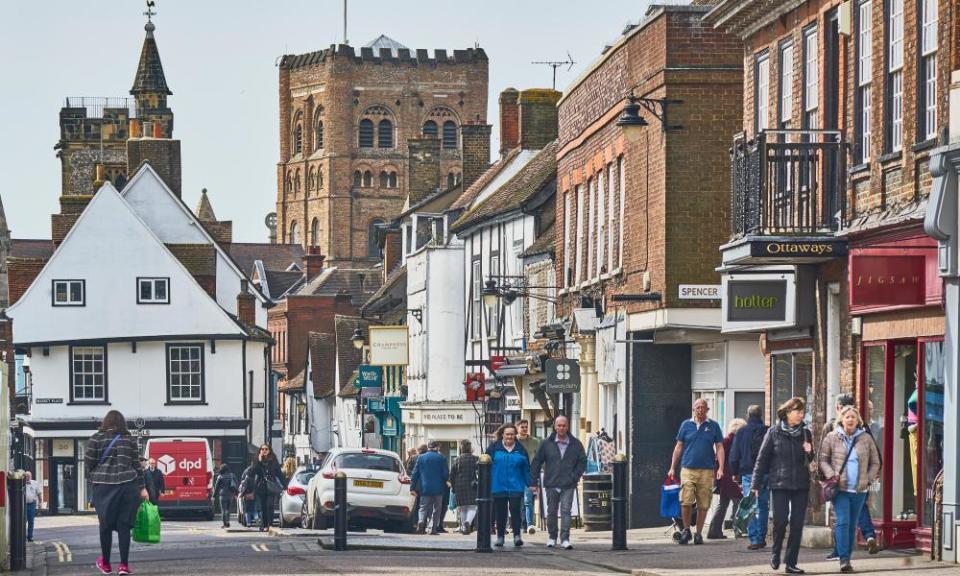The age of the office is over – the future lies in Britain's commuter towns

Is the office dead? Not an office, which everyone needs, but “the office”, the institution, the corporate HQ, the great overhead in the sky. Just as once the farm gave way to the factory and the factory to the desk, so technology transforms the nature of work. At the turn of the 21st century the digital revolution shrank offices to tiny screens. From then on offices have lived on borrowed time. Coronavirus has called their bluff. But has bluff also been called on the office’s sovereign domain, the city centre?
When in March Boris Johnson ordered Britons to “stay at home”, I heard a death-knell sound. So shocking was this fear-based lockdown that a new Morgan Stanley survey shows that even now only 34% of British office workers have gone back to work. This compares with 76% in Italy and 83% in France.
Two weeks ago Johnson abruptly changed his mind and told office workers to report for duty. Few have obeyed. Walk through London’s Canary Wharf, Manchester’s Deansgate or Birmingham’s Colmore Row, and you see ghost cities. Offices stand vacant, shops, pubs and cafes closed and even boarded up. Come September, some workers will return, but I can find no expert who expects them in anything like their previous numbers.
In his classic biography of the Cambridgeshire village of Foxton, The Common Stream, Rowland Parker described its many traumas. They included invading Saxons, the Black Death and, most recently, the arrival of combine harvesters in the 1920s. The machines slashed the need for farm labour. The village emptied. Rural vitality was devastated.
Since then Foxton has recovered as a dormitory suburb for office workers in Cambridge and even London. But does it now face another change, that of home-working? Across Britain there must be many people wondering if they really want to fight their way to a city office block when their home can be their office. Morgan Stanley reports a mere 18% of European office workers wanting to return to an office five days a week. Fulltime home working is estimated to raise productivity by more than 16 days over a full year.
The media is awash in studies declaring that offices are good for us after all. They promote social diversity and informal contacts, offering relief from relationship claustrophobia in “getting out of the house”. Management ideology has long identified “the company” with its headquarters, its physical presence and hierarchy. The New Scientist reports the boss of Microsoft worrying that unmonitored home working will eat into the “social capital” built up in an office environment. Zoom cannot replace the gossip of “those two minutes before and after” a meeting. We know that from TV’s The Office.
None the less, office workers seem certain to vote with their feet. As a Birmingham lawyer told the Guardian, “There is absolutely no reason for us to be in this office every day – I can do my job perfectly well from anywhere.” He spoke for millions. Hence the three-quarters of American CFOs now accepting that they must introduce remote working.
How drastic the impact on city business districts will be is uncertain. Those in London, Birmingham, Manchester and Leeds have been planned for decades on an assumption of rising office demand. The LSE cities expert Prof Tony Travers says that for them, “It’s like death, too frightening to predict. But a conservative guess might be that half of workers opt for some form of remote working, perhaps for half their time.” That is a roughly 25% cut in traditional office occupancy.
Emptying city centres of a quarter of their office workers would be commercially devastating. It would wipe out the profit margins of the shops, cafes and pubs that depend on them. Rents would plummet on newly emergent office blocks, lacking as they do the adaptability of the old Victorian streets they replace. Towers will blight townscapes as corporate dinosaurs.
Commuting has come to be seen as an unnecessary health hazard. A worker visiting his or her office will be like going shopping, an occasional discretionary activity. Yes, we will value the human contact with workplace friends, clients and associates, but not 9-to-5, five days a week. This treadmill was the ethos of Dickens’ factory work carried into the office. It is out of date.
This need not be bad news for cities. The decline in offices will leave more space for housing. Cultural and leisure activities will recover. Historic quarters – if conserved – will attract the creative industries that are seen as holding the key to modern city economies, industries that thrive on urban concentration. I was intrigued by Angus Thirlwell of the Hotel Chocolat chain bewailing to the BBC the fate of his big city outlets, while lauding his successes in Cheltenham, St Albans, Stamford and Harrogate. These are the new work hubs. If I was in the property game, I would buy anywhere with a cathedral.
Clearly the idea of corporate space, of the company building, is in crisis. As for office work, I sense the future lies with small towns and suburban villages, those not about to be wrecked by Robert Jenrick’s Los Angeles-style planning changes. It lies in places commuters call home, where they can replace the ties of office with those of neighbourhood. The shift may be no more than 25%, but in demography a trend is a revolution.
• Simon Jenkins is a Guardian columnist

 Yahoo News
Yahoo News 